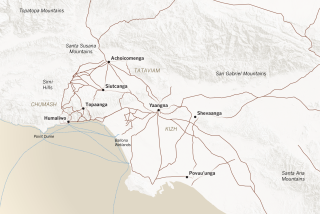Will Tribes Be Overrun? : Glut of Foreign Trekkers Sparks Fear Among Thais
- Share via
CHIANG MAI, Thailand — Armed with cash and cameras, foreign trekkers by the thousands are scouring the hills of northern Thailand for unspoiled tribal people, turning the region into “a human zoo,” critics say.
Thai officials, Christian missionaries and others interviewed say these increasingly popular treks by Western Europeans, Americans and Australians are hastening the erosion of traditional culture among 500,000 tribal people already reeling under rapid modernization.
Villagers are selling their colorful costumes, jewelry and other heirlooms or exchanging them for jeans and other Western goods offered by trekkers. And intruding brusquely into village life are some Westerners who, as former tour operator Bill Young recalls, “run around with their breasts hanging out.”
“Nothing is free now. Their traditional hospitality has been corrupted,” American missionary David Morse says. “Before they would offer food and lodging to strangers. Now they no longer accept people for who they are. They have become hardened, less open.”
100,000 Trekkers in ’88
According to the government’s tourist authority, tribal trekking has grown from a handful of hikers in the 1970s to more than 100,000 last year.
Most sign up with tour companies in this major northern Thai city, then make their way by jeep, bamboo raft, elephant, motorcycle or foot to the hill villages of the Akha, Karen, Hmong, Lisu, Lahu and other tribes.
The trekking companies capitalize on the region’s natural beauty and the lure of the exotic and notorious--the area is part of the so-called Golden Triangle of opium fields and warlord armies.
“Padaung hill tribes now available,” reads one typical advertisement, which has prompted critics to charge that the tribal people are being marketed like animals on a safari or in a zoo.
Young, a longtime American resident of northern Thailand, says trekking agencies vary greatly.
Some, he says, educate clients about local cultures, while others may offer an “opium experience” and provide opportunities for “authentic” photographs by getting tribesmen to smoke their opium pipes or engage in courtship rituals.
Some trekkers have died of drug overdoses. Violence and robbery against tourists--once unheard of--are on the rise as cultures clash and cash is haphazardly injected into primitive economies.
Few Controls Over Agencies
Suppakit Apasil, director of the government’s tourism office in Chiang Mai, says part of the trouble stems from lack of controls over the mushrooming agencies and the trekking industry, which brings $5 million annually to the city.
More to Read
Sign up for Essential California
The most important California stories and recommendations in your inbox every morning.
You may occasionally receive promotional content from the Los Angeles Times.










